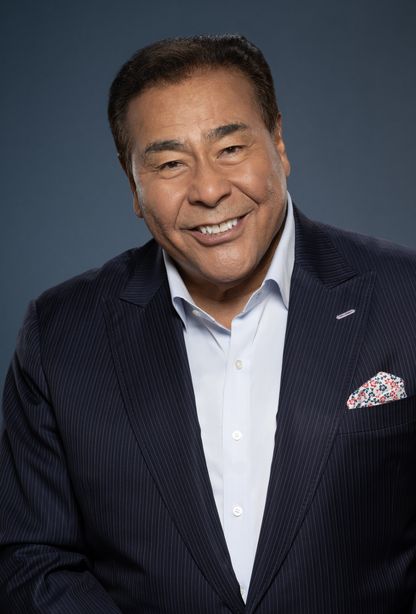John Quiñones
John Quiñones is an ABC News correspondent who reports across “20/20,” “Nightline” and “Good Morning America.” During his 40-year tenure at ABC News, he has reported extensively for all programs and platforms and served as anchor of “What Would You Do?” and “Primetime.”
Recently, Quiñones has been on the frontlines of ABC News’ “Uvalde: 365” series, reporting from Uvalde, Texas, in the aftermath of the mass shooting at Robb Elementary. For “20/20,” Quiñones extensively reported on Fort Hood soldier Vanessa Guillen, who was brutally murdered and sparked a #MeToo movement in the military. Quiñones’ reporting on Guillen included an exclusive interview with Ryan McCarthy, secretary of the Army. Following his reporting on Guillen, the U.S. military made major changes in how they handle sexual harassment cases, and Congress passed the I Am Vanessa Guillen bill.
In 2021, Quiñones conducted the first exclusive network television interview with Mexican professional boxer Canelo Álvarez, who won multiple world championships in four different weight classes. The report was featured in a primetime ABC News Hispanic Heritage Month special and on “Nightline.”
While Quiñones covered the Chilean miners’ disaster in 2010, he was the first journalist out of thousands to get an exclusive interview with the first survivor, Mario Sepulveda, who spoke about their horrendous ordeal. Other headline-making interviews include an exclusive with singer/actor Marc Anthony, who, for the first time, spoke about his separation from Jennifer Lopez and their pending divorce.
Quiñones extensively covered a religious sect in northern Arizona that forced its young female members to participate in polygamous marriages. Other reports include going undercover with a hidden camera to reveal how clinics performed unnecessary surgical procedures as part of a major nationwide insurance scam, following along with a group of would-be Mexican immigrants as they attempted to cross into the U.S. via the treacherous route known as “The Devil’s Highway,” and traveling to Israel for a CINE Award-winning report about suicide bombers.
In September 1999, Quiñones anchored a critically acclaimed ABC News special entitled “Latin Beat,” focusing on the wave of Latin talent sweeping the U.S., the impact of the recent population explosion and how it will affect the nation as a whole. He received an ALMA Award from the National Council of La Raza. He also contributed reports to ABC News’ unprecedented 24-hour, live, global “The New Millennium” broadcast, which won the George Foster Peabody Award.
Quiñones’ reports for “20/20” include an in-depth look at the unprecedented lawsuit against the Cuban government by a woman who claimed she unknowingly married a spy and an exclusive interview with a Florida teenager who brutally killed her adoptive mother. He was honored with a Gabriel Award for his poignant report that followed a young man to Colombia as he made an emotional journey to reunite with his birth mother after two decades. Other stories originating from Central America include political and economic turmoil in Argentina and civil war in El Salvador. During the 1980s, he spent nearly a decade in Nicaragua, El Salvador, Guatemala, Honduras and Panama, reporting for “World News Tonight.”
Quiñones won seven national Emmy® Awards for his work on “Primetime Live,” “Burning Questions” and “20/20.” He received an Emmy for his coverage of the Congo’s virgin rainforest, which also won the Ark Trust Wildlife Award. In 1990, he received an Emmy for “Window in the Past,” a look at the Yanomami Tribe. He received a National Emmy Award for his work on the ABC documentary “Burning Questions: The Poisoning of America,” which aired in September 1988.
In 2024, John was honored with the Distinguished Journalist Award presented by DePaul University’s Center for Journalism Integrity & Excellence and became a member of the NATAS Silver Circle. In 2022, Quiñones received the Lifetime Achievement Award from MALDEF (Mexican American Legal Defense and Educational Fund), the country’s oldest and most prominent Latino civil rights organization; was named a “Fellow of the Society” by the Society of Professional Journalists; and received the President’s Award for Journalism Excellence from the National Association of Hispanic Journalists. In 2021, Quiñones received the Carr Van Anda Award for his “enduring contributions to journalism” from the E.W. Scripps School of Journalism at Ohio University, as well as the “Inspire: Visionary Leadership Award” from the Anne Frank School in San Antonio for “What Would You Do?” scenarios that shined a light on antisemitism in the United States. In 2019, he received RTDNA’s John F. Hogan Award for national and international reporting.
Quiñones was also honored with a World Hunger Media Award and a citation from the Robert F. Kennedy Journalism Awards for “To Save the Children,” his 1990 report on the homeless children of Bogota. Among his other prestigious awards are the First Prize in International Reporting and the Robert F. Kennedy Prize for his piece on “Modern Slavery — Children Sugar Cane Cutters in the Dominican Republic.”
Quiñones joined ABC News in June 1982 as a general assignment correspondent based in Miami, providing reports for “World News Tonight with Peter Jennings” and other ABC News broadcasts. He was one of the few American journalists reporting from Panama City during the U.S. invasion in December 1989.
Prior to joining ABC News, he was a reporter with WBBM-TV in Chicago. He won two Emmy Awards for his 1980 reporting on the plight of migrants from Mexico. From 1975 to 1978, he was a news editor at KTRH radio in Houston, Texas. During that period, he also was an anchor/reporter for KPRC-TV.
Quiñones received a Bachelor of Arts in speech communications from St. Mary’s University, San Antonio, Texas. He received a master’s from the Columbia School of Journalism. Quiñones received two honorary degrees: In 2016, he received an Honorary Doctorate of Humane Letters from Utah Valley University and, in 2014, a Doctor of Letters from Davis & Elkins College.








